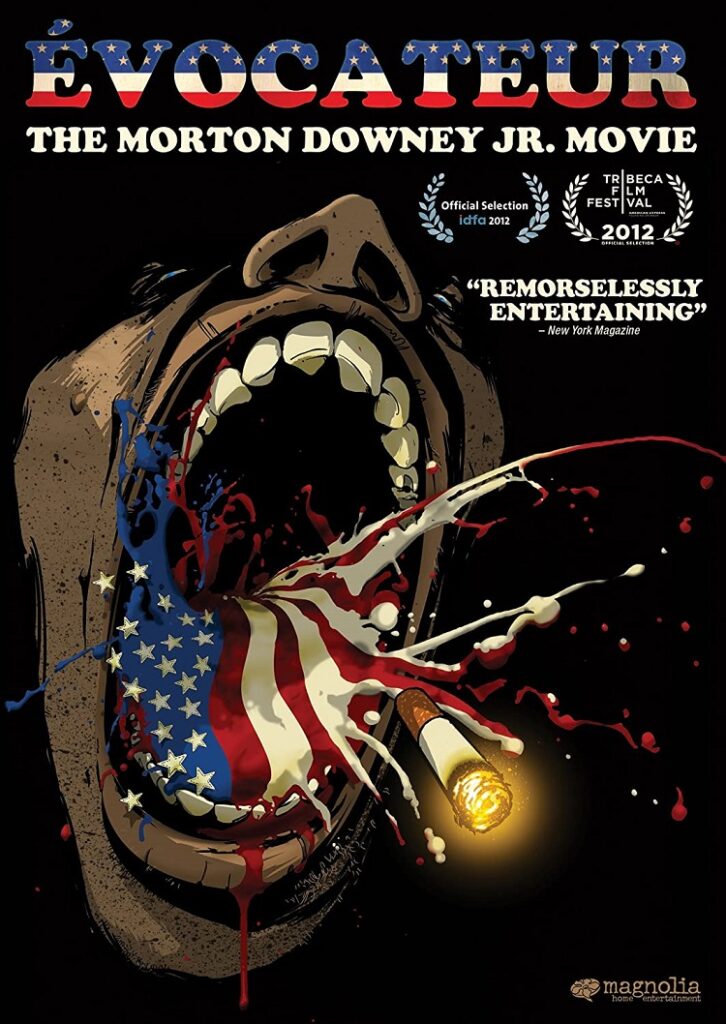
Written by Michael Nazarewycz
In case I haven’t said this before, I am a sucker for nostalgia – particularly ‘80s nostalgia. I spent the entirety of my teenage years living in the decade of decadence, and while you might not catch me wearing anything DayGlo, you will still find Wayfarers on my face, Reeboks on my feet, a formidable ‘80s music collection on my iPod, and even a few episodes of Battle of the Network Stars on my DVR.
One of the joys of being nostalgic, especially as much as I am, is when a memory hits me that I didn’t expect. It’s easy to think that I remember all of the pop culture from my youth, so when I’m reminded of something I had completely forgotten … particularly something fond … it’s an extra bonus.
Such was the case when I was presented the opportunity to review a screener of Evocateur: The Morton Downey Jr. Movie. I had all but forgotten about Downey and as I started the film, I couldn’t imagine how. Like many things from the ‘80s, surely the bombastic talk show host who was too loud to be ignored was also too resonant to be forgotten. But as the movie played, it became more and more evident that it wasn’t my memory that had failed me, but rather Downey, who was less of a cultural icon and more of a one-hit wonder.
Evocateur is a documentary told along two interwoven timelines. The first is the more prominent, and certainly the more rich in footage – Downey’s professional career. He began as a singer who was never as good as his father (more on that later). He eventually turned to a career in radio, which led to a local television talk show on WOR out of Secaucus, NJ. Downey’s aggressive, confrontational style was a marked contrast to the successful touchy-feely talk show hosts of the era, namely Phil Donahue and Sally Jesse Raphael. He smoked, he screamed, he used phrases like “pabulum puking,” and he knew how to rally and rile an audience. And while Downey wasn’t the first aggressive talk show host on the airwaves (the film is clear to give that credit to Joe Pyne), he was certainly one of the early screamers, casting a crude mold for the likes of some of today’s radio and television bombasts to refine and monetize.
The other timeline, which is really only scattered throughout the film, delves into Downey’s childhood and pre-television years, and makes the assertion that he resented his father for the ruination of his mother, and that all that drove him was to be more successful than his dad (a renowned singer).
When Evocateur cranks in latter-day highlight-reel mode is when it’s at its best, but that’s something of a backhanded compliment. Yes, it is great to revisit all of the moments that put Downey Jr. on the map, and it is interesting to gain perspective about the man from an eclectic mix of people, from the show’s producers to Downey’s contemporaries (Richard Bey and Sally Jesse Raphael), and from former frequent audience members (at the time teens, now in their 40s) to people like Pat Buchanan (!) and Gloria Allred (!!!). But there is a difference between a Best Of collection and a documentary, and Evocateur relies too much on the former to ever really reach the latter.
It presents Downey’s youth almost obligatorily; it feels like his early years were added so that the film wasn’t just a 90-minute clip package of cigarettes and screeds. And while it reiterates throughout the film that Downey was motivated by his anger towards his father, and that might be 100% true, it never really feels that way. It feels like Downey’s father was the villain the story needed so that Downey could be closer to being a hero than the anti-hero he so often played.
This lack of a solid personal connection to the subject isn’t just hindered by the potential that the people from Downey’s past might not have been available. Even Downey’s most recent history, from the demise of his show to his financial woes to his ultimate death from cancer, all felt as if they were there because they were supposed to be, not as integral parts of a greater narrative. In fact, the biggest focus of the last years of Downey’s life focused on his marriage to a considerably younger woman and his reckless behavior. It’s as if the documentary of the sensationalist felt it needed to be sensationalistic as well.
Even certain moments of Downey’s life are represented by animated shorts, and unless your logo includes the names Disney or Pixar, it’s hard to connect to a cartoon.
In the end, I enjoyed parts of Evocateur: The Morton Downey Jr. Movie more than I enjoyed its sum. If you were around for Downey’s two-year (that’s it?!) dominance and watched his show with any regularity, the clip reel feel will work for you. Otherwise, you might leave the film with no fewer answers than you came in with.